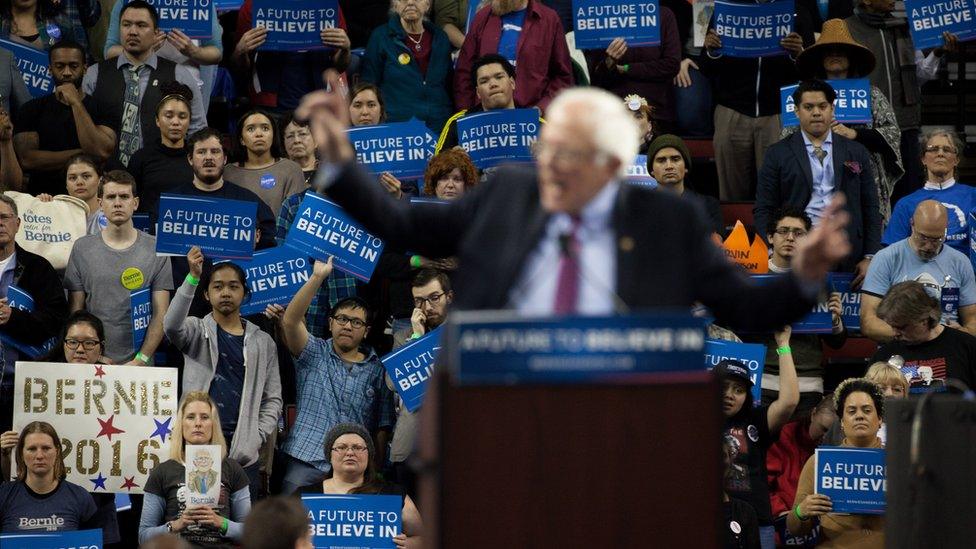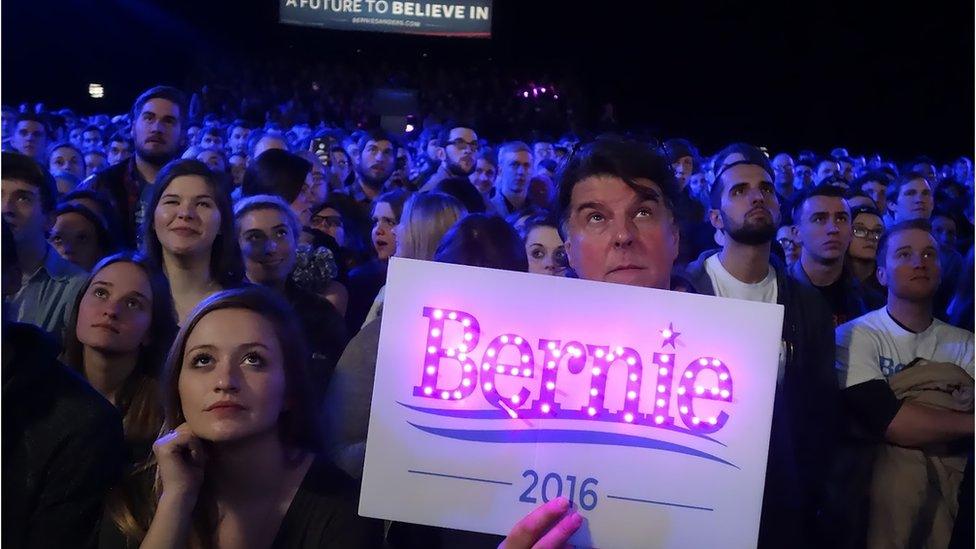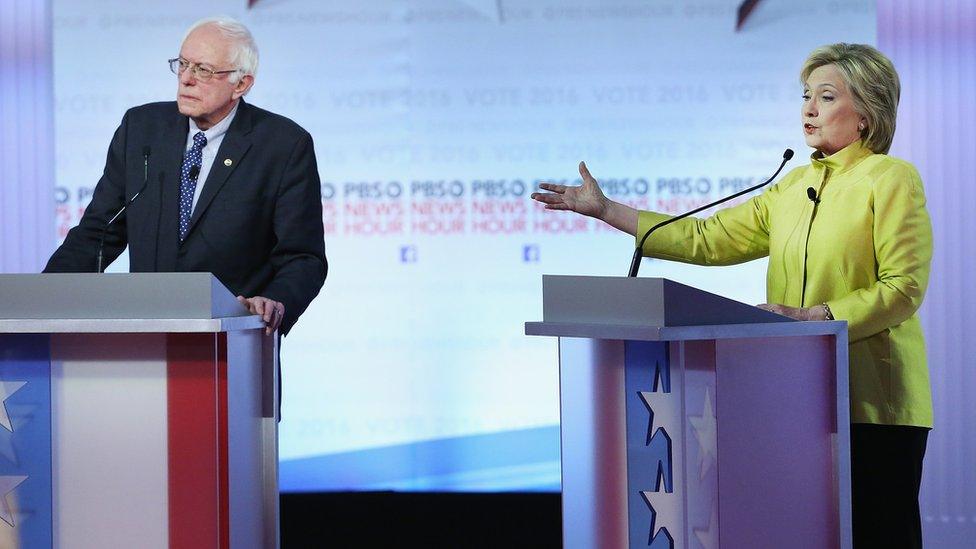Will Bernie Sanders' enthusiasm be curbed?
- Published

Trailing in the delegate count with only a handful of state primaries remaining, the Bernie Sanders presidential campaign has almost run its course. The fate of the progressive movement the candidate has inspired, however, is still an open question.
At this point Mr Sanders would have to win, external about 80% of the remaining uncommitted delegates in order to surpass Hillary Clinton and claim the Democratic nomination. After losing five of the last six primary contests, reports surfaced last week that the campaign is laying off hundreds of staffers.
Mr Sanders has said he has no plans to drop out of the race, but it appears his campaign will be a scaled-back effort over the final weeks.
While the grim news is growing increasingly difficult for all but the most blinkered, external Sanders supporters to ignore, the campaign likely will be remembered for its notable accomplishments. A race that appeared to be preordained as a Hillary Clinton coronation was, for a time, a political dogfight. The quirky, dishevelled underdog became the unlikely messenger for a progressive movement and a fund-raising powerhouse.
When the final results are tallied it will be clear that the Sanders campaign didn't just go toe-to-toe with Mrs Clinton, it actually pulled ahead, external in total dollars raised and spent, dominating the airwaves in some states.
With the primary campaign season drawing to a close, the coalition the campaign assembled is now considering how to preserve the infrastructure it has built and the enthusiasm it has generated.
The question is simple. What next?

Party platform
Of immediate concern to progressive groups and the Sanders faithful is the Democratic National Convention in July and the party platform that will be written by delegates there.
Shortly after his sweeping losses in last Tuesday's mid-Atlantic primaries, the Sanders campaign released a statement saying that their goal was to accrue "as many delegates as possible to fight for a progressive party platform". Although Sanders advisors still say their man has a path to the nomination, the release avoided such talk.

Mr Sanders became the unlikely leader of a progressive awakening
During an interview, external with the Washington Post, Mr Sanders said his goal is to "make certain" the party endorses "the most progressive platform in the history of this country, a platform that includes many of the ideas that we have been fighting for throughout this campaign."
For Ben Wikler, Washington director of MoveOn - a progressive group that endorsed Mr Sanders early in the primary season - that includes breaking up big banks, addressing financial-sector corruption, raising the national minimum wage to $15 an hour, mandating paid family leave and making college tuition-free for all Americans.
"We need an action plan that acknowledges clearly how the system has been rigged to benefit those at the top," he said. "And gives the American people a fighting chance."
While the platform has no binding power on the party's candidates, it's a concrete statement of a party's priorities and values and occasionally becomes a target of opponents in the general election campaign.
In 2012, for instance, Democrats and Republicans exchanged attack over the abortion positions laid out in their respective platforms.
"This party is full-bore on abortion for any reason at any time," Congresswoman Marilyn Musgrave said, external of the Democrat's platform language.
According to Nicholas Confessore of the New York Times, the committee responsible for drafting the party platform is being stocked with Clinton supporters - in part to protect the former secretary of state from future trouble.
Inside the Sanders campaign, with Bernie's official photographer
"Mrs Clinton is well positioned to block any proposals she would not want to defend in a general election," he wrote, external.
If Mr Sanders can enter the convention with a sizeable number of delegates by campaigning hard through the remaining primaries, including big-prize California, he may be able to force the party to act.

Primary reform
Mr Sanders has also called for reforming the party's primary system to make it more open to fellow outsider candidates. That includes reducing the number of so-called "super-delegates" - party insiders who make up more than 20% of the total delegate count - and doing away with primaries and caucuses that are open only to registered Democrats.
Throughout the 2016 campaign Mr Sanders has done better in states such as Wisconsin and New Hampshire, where independent voters are eligible to participate, and struggled in closed-primary states like New York and Florida.
"I think clearly the convention and the Democratic National Committee can change the rules and can create a scenario that makes it clear that we want open primaries in 50 states in this country," he told the Post.

More on the 2016 US election

Confronting Congress

Hillary Clinton has said Bernie Sanders could never get his agenda through a Republican-controlled Congress
While the presidency is the goal, progressives also see Congress as a logical next step for their efforts. Sanders repeatedly faced sharp questions, including from Mrs Clinton, about whether the vision he outlined and the promises he made were realistic given the Republican Party's ongoing control of the legislature.
A group of Sanders campaign staffers have started a group called Brand New Congress, through which they hope to use the resources of the Sanders campaign - fund-raising, human and technological - to identify and support progressive congressional candidates across the US.
"The idea isn't so complicated," says Saikat Chakrabarti, a Sanders campaign developer who is a co-founder of Brand New Congress. "We'll have a centralised campaign organisation where we have this national infrastructure to elect progressives to Congress."
The key, he says, is identifying individuals who would be good politicians but are turned off by the political process.
"We don't want to find people who are in it for the power grab," he says. "It's hard to run right now unless you become a full-time fundraiser. By centralising that whole infrastructure of running the campaign, it frees up a candidate to meet people and talk about the issues."
Although the group wants to start funding candidates in 2016 - and Bernie Sanders himself has raised money for progressive candidates already - they're targeting the mid-term elections of 2018, when liberals are more likely to turn out to vote in smaller numbers.
Their goal is to have a role in Republican and Democratic primaries across the country. If their candidates lose, they'll consider fielding independents in the general election, as well.
"This race has shown that what people think a Republican looks like or a Democrat looks like is completely off base," Chakrabarti said. "I think people more and more are tired of the party system. People want good candidates and good people to win."

Post-election ennui
All this talk of capitalising on a surge in political organising, record small-donor fund-raising and an activist groundswell is somewhat familiar, of course. In 2008, it was Barack Obama who was drawing the huge crowds and re-inventing how campaigns operate.
Now, more than seven years later, some of the foot soldiers in the 2008 campaign have been saying that Mr Obama abandoned the grass-roots once he entered the Oval Office.
"A lot of people felt disappointed," Chakrabarti said. "Obama tried to make deals with Republicans, and I don't think he realized he'd have such an insanely opposing Congress."
The volunteer movement became "divorced" from the Obama presidency, he said, and the progressive cause suffered. This time things will be different.
WATCH: Sanders 'phenomenon' is not just a candidacy but a movement
"From the start, you give all these people who spent all this time trying to get Bernie Sanders elected confidence that they're not going to be cast aside," he said. "And I think people get really electrified by having specific goals and campaigns."
Kevin Drum of the liberal magazine Mother Jones paints a much bleaker picture, however.
"Most likely Bernie will have no lasting effect, and his followers will scatter in the usual way, with some doubling down on practical politics and others leaving for different callings," he wrote, external. "But there's a decent chance that Bernie's failure will result in a net increase of cynicism about politics, and that's the last thing we need. I hate the idea that we might lose even a few talented future leaders because they fell for Bernie's spiel and then got discouraged when it didn't pan out."
MoveOn's Wikler disagrees.
"We're going to see a revolution within the Democratic Party," he said. "It's not just insiders calling the shots anymore."
"I think the writing is on the wall, and the Democratic Party can read."